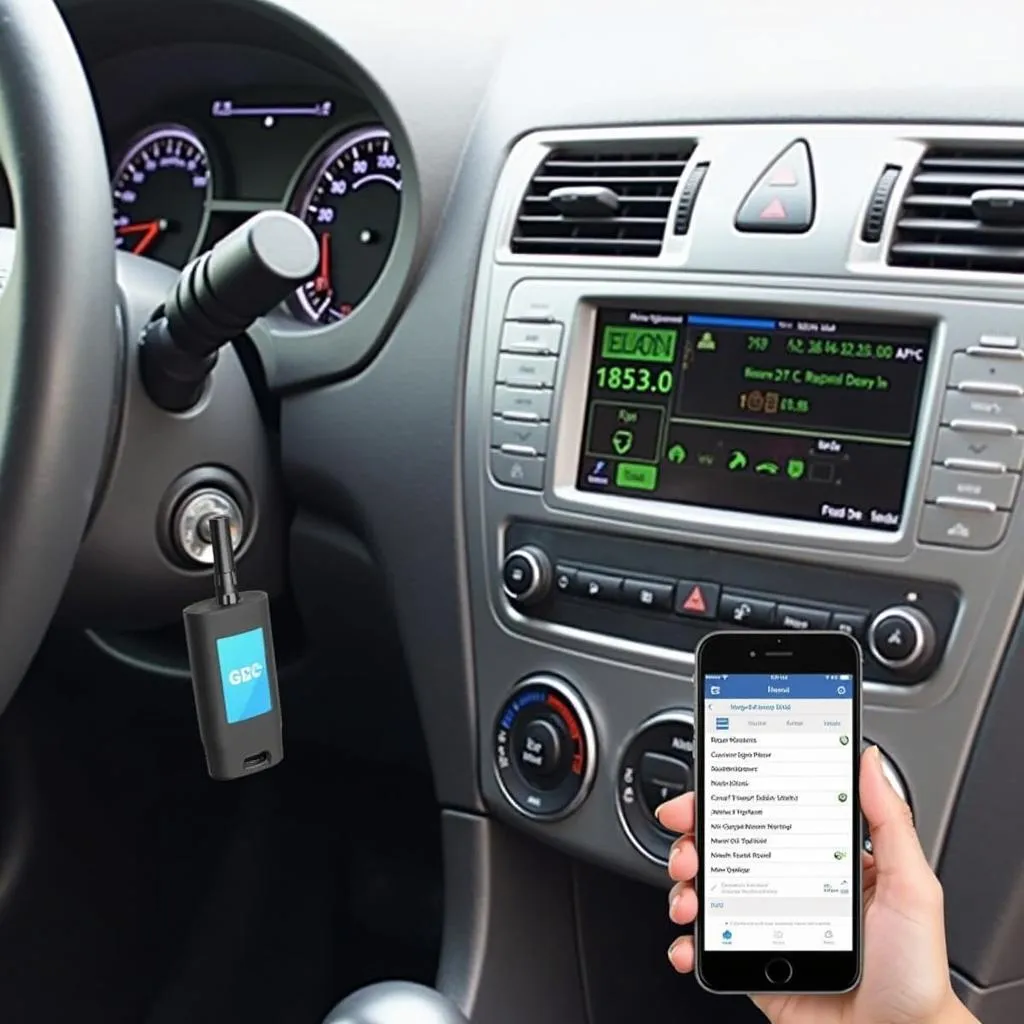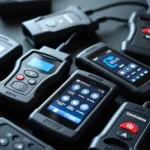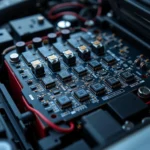Finding the right OBD2 scanner can feel like navigating a maze of technical jargon and confusing specs. Whether you’re a DIY mechanic tackling a check engine light or a professional technician looking for advanced diagnostics, choosing the best OBD2 scanner for your needs and budget is essential. This comprehensive guide cuts through the noise and delivers the information you need to make an informed decision, helping you find the perfect scan tool to unlock your vehicle’s inner workings.
Understanding Your Needs: The First Step to Finding the Best OBD2 Scanner
Before diving into the world of OBD2 scanners, it’s crucial to define your requirements. Asking yourself these key questions will narrow down your choices:
- What is your skill level? Beginner-friendly scanners offer simple interfaces and basic functions, while advanced options cater to experienced users with comprehensive diagnostics and customization.
- What type of vehicle do you need to diagnose? While most scanners work on a wide range of vehicles, some specialize in specific makes and models, providing in-depth manufacturer-specific codes and data.
- What is your budget? OBD2 scanners range from affordable code readers to high-end professional tools. Determining your budget upfront will help you focus on the options that align with your financial constraints.
Types of OBD2 Scanners: Choosing the Right Tool for the Job
The “best” OBD2 scanner is subjective and depends on individual needs. Here’s a breakdown of common types:
1. Basic Code Readers: Affordable and User-Friendly
As the name suggests, basic code readers primarily read and clear basic diagnostic trouble codes (DTCs). These budget-friendly options are perfect for DIYers who want to understand and address check engine lights.
2. Bluetooth Scanners: Unleashing Smartphone Diagnostics
Bluetooth OBD2 scanners connect wirelessly to your smartphone or tablet, displaying real-time data and diagnostics through user-friendly apps. These scanners offer excellent value for money, combining affordability with enhanced functionality.
3. Professional-Grade Scan Tools: The Ultimate Diagnostic Powerhouse
Professional mechanics and experienced DIYers rely on professional-grade scan tools for their comprehensive diagnostics, advanced features, and extensive vehicle coverage. These scanners can access manufacturer-specific codes, perform bi-directional controls, and provide in-depth live data analysis.
Key Features to Consider: Unveiling the Essentials
Beyond the basic types, several key features differentiate OBD2 scanners:
- Live Data Streaming: This feature displays real-time engine parameters, such as RPM, speed, coolant temperature, and oxygen sensor readings. Live data is invaluable for diagnosing issues, monitoring performance, and analyzing sensor data.
- ABS and Airbag Reset: Some scanners offer the ability to read and reset ABS (Anti-lock Braking System) and airbag codes, saving you a trip to the mechanic for these common issues.
- Bi-Directional Controls: This advanced feature allows you to command specific vehicle components, such as turning on fuel injectors or activating solenoids, for pinpoint diagnostics and component testing.
Decoding the Jargon: Essential OBD2 Terms Explained
Navigating the world of OBD2 scanners involves understanding some technical terms:
- DTC (Diagnostic Trouble Code): A standardized code representing a specific vehicle fault detected by the onboard computer.
- CAN (Controller Area Network): A communication protocol used in modern vehicles for different modules to exchange data.
- Freeze Frame Data: A snapshot of engine parameters recorded when a DTC is triggered, providing valuable context for diagnosis.
- VIN (Vehicle Identification Number): A unique code identifying a specific vehicle, often used by scanners for accurate vehicle identification.
The Verdict: Finding Your Perfect OBD2 Scanner Match
Ultimately, the “best” OBD2 scanner for the money depends on your individual needs, budget, and technical expertise. By carefully considering the factors outlined in this guide, you can confidently choose the right tool to empower your automotive endeavors.
FAQs
Q: Can I use any OBD2 scanner on any car?
A: While most OBD2 scanners work on a wide range of vehicles, compatibility depends on the vehicle’s make, model, and year. Always check the scanner’s specifications and compatibility list before purchasing.
Q: Do I need an expensive scanner for basic diagnostics?
A: Not necessarily. Basic code readers offer excellent value for DIYers looking to read and clear check engine lights and access basic diagnostic information.
Q: What is the difference between OBD2 and EOBD?
A: OBD2 is the standard in North America, while EOBD (European On-Board Diagnostics) is the European equivalent. Both systems share similarities but may have specific regional requirements.
Q: Can an OBD2 scanner fix my car?
A: OBD2 scanners are diagnostic tools, not repair tools. They help identify issues but don’t physically fix them.
Q: Where can I learn more about specific OBD2 scanner models?
A: For detailed reviews and comparisons of the latest OBD2 scanners, visit our website’s OBD2 scanner review section. We provide in-depth analyses of popular models to help you make an informed choice.
Need Expert Assistance? We’re Here to Help!
Choosing the right OBD2 scanner can feel overwhelming, but it doesn’t have to be. Our team of automotive experts is ready to answer your questions and guide you toward the perfect tool for your needs. Contact us via WhatsApp: +1(641)206-8880, or Email: [email protected]. We offer 24/7 customer support to ensure you’re always covered.


